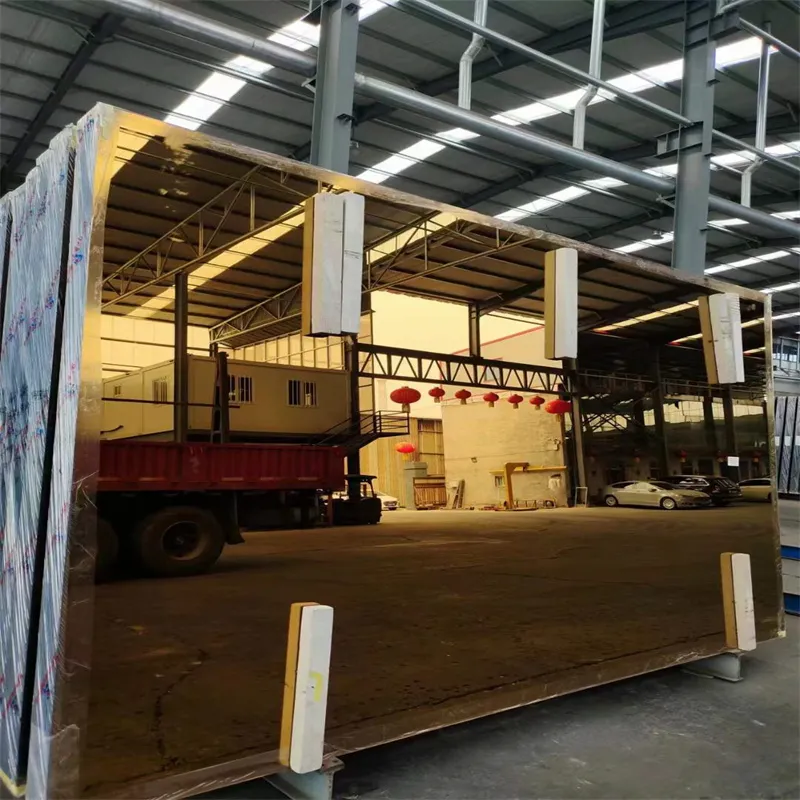Dec . 13, 2024 00:15 Back to list
Exploring the Characteristics and Applications of Float Glass in Modern Industries
The Properties of Float Glass An Overview
Float glass, also known as flat glass, is a type of glass that is created through a unique manufacturing process that involves floating molten glass on top of molten tin. This method yields a product that is extremely flat, smooth, and uniform in thickness, making it particularly valuable for a variety of applications in architecture, automotive, and interior design. Understanding the properties of float glass is essential for its optimal use in these industries.
Composition and Manufacturing Process
Float glass is primarily composed of silica sand, soda ash, and limestone, which are the main raw materials. These materials are melted in a furnace at temperatures exceeding 1,500 degrees Celsius to form a molten glass mixture. Once the glass reaches a liquid state, it is poured onto a surface of molten tin. The glass floats on the tin, allowing it to spread evenly, creating a smooth and flat surface. The thickness of the glass can be controlled by the amount of glass poured and the speed at which it flows.
After the glass has reached the desired thickness, it is cooled in a controlled manner through an annealing lehr, which helps to relieve internal stresses. Once cooled, the glass can be cut, polished, and finished for various applications.
Key Properties of Float Glass
1. Flatness and Uniformity One of the standout features of float glass is its exceptional flatness. The manufacturing process ensures that the glass is uniform in thickness and has extremely low distortion, making it ideal for applications where clarity and visual accuracy are paramount, such as in window panes and display cases.
2. Optical Clarity Float glass possesses high optical clarity and transparency. The lack of surface distortion and its minimal inclusions allow for a clear view, which is essential for architectural applications, such as facades and skylights. Moreover, float glass can be treated or coated to enhance its UV resistance and thermal properties, further improving its performance.
float glass properties

3. Durability and Strength While float glass is relatively fragile compared to other materials, it exhibits considerable strength when manufactured correctly. It can withstand moderate impacts and is resistant to weathering. For applications requiring heightened safety measures, float glass can be tempered or laminated to enhance its strength and shatter resistance.
4. Thermal Properties Float glass has a low thermal expansion coefficient, which allows it to maintain its shape and integrity under varying temperature changes. However, standard float glass is not particularly energy-efficient. Therefore, manufacturers often produce low-emissivity (low-e) glass through additional coatings, improving energy efficiency in buildings by reflecting heat back into the interior.
5. Chemical Resistance The chemical durability of float glass is another notable property. It is resistant to many chemicals, making it suitable for environments where exposure to various substances occurs. This durability enhances its applicability in laboratories and industrial settings.
Applications of Float Glass
Float glass is widely used in many industries due to its advantageous properties. In the building and construction sector, it is used for windows, glass doors, and facades, enhancing both aesthetics and energy efficiency. The automotive industry utilizes float glass for windshields and vehicle windows, where safety and clarity are essential. Furthermore, float glass is also a popular choice for interior applications, including mirrors, glass partitions, and decorative elements.
Conclusion
Float glass is a remarkable material characterized by its superior flatness, optical clarity, and durability. As technology advances, the demand for high-performance float glass continues to grow in various industries. Its unique properties make it an indispensable material in modern architecture and manufacturing. As a versatile material, float glass is likely to remain a fundamental component of our built environment, contributing to both functionality and aesthetic appeal. Understanding its properties allows designers and architects to leverage its advantages effectively, ensuring that float glass fulfills its role in contemporary construction and design.
-
Safety and Style with Premium Laminated Glass Solutions
NewsJun.24,2025
-
Reinvents Security with Premium Wired Glass
NewsJun.24,2025
-
Premium Float Glass Line for Modern Architecture
NewsJun.24,2025
-
Low Emissivity Glass for Energy-Efficient Architecture
NewsJun.24,2025
-
High-Performance Insulated Glass Solutions for Modern Architecture
NewsJun.24,2025
-
Elevates Interior Style with Premium Silver Mirror
NewsJun.24,2025
Related PRODUCTS














